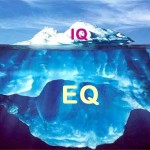
This mockup of what drawing was like on my touchscreen shows clearly which parts of the screen don't work.
I’ve been the owner of an Android phone (HTC Incredible S) for 9 months now, but today I sent it off to get serviced because the touchscreen has been acting up. I first noticed the touchscreen behaving strangely this fall, when horizontal bands of the screen would sometimes be unresponsive. On the right, in a mockup of a drawing app, you can see how poking the screen produced no dots on the band, and so on. This was even more annoying when trying to type, because the bottom band passed right through the home-row (if you can still call it that on a touchscreen) of the keyboard.
Anyway, at first it would just do this for a few minutes every day, but then it started to act up like this consistently. The problems got progressively worse until by mid-January I could never be certain at any given moment that I’d be able to use my phone at all. Furthermore, touch events started happening in the wrong places—I would try to select “Yes” and the screen would select “No”, or taps would become long presses. Sometimes the phone would seem to think I had touched somewhere on the screen when it was sitting a foot away on my desk, and would navigate interfaces on its own.

I think this is a terrible analogy, because I think EQ is easier to assess on the surface than IQ is. Anyway, I didn't make the image.
Emotional intelligence (hereafter EI, though often called EQ like IQ) is a term that is used to describe one’s ability to perceive others’ emotions and response appropriately in social situations. As the image here from Psychology Today illustrates, EQ is ascribed a fair amount of importance. The same concept is also embodied in maxims like “It’s not what you know, but who you know”.
So if we were to map the concept of IQ to technology, it could refer to a number of things, but at the forefront is processing power and efficiency/effectiveness of algorithms. Of additional consideration is the ability to learn new things, which is likely where the concept of a smartphone comes from: in addition to built-in phone features like SMS and alarms, smartphones can play games, interact with social networks, and let us draw, to mention just some of the hundreds of thousands of apps out there.
How, then, would we map EI, or EQ? Emotional intelligence, for a computer or smartphone, or any piece of software, is its interface. A piece of software has good EI if it responds the way you expect it to, and even better EI if it anticipates your needs and makes it easy to accomplish your goals. When our technology does this, we adore it, and when it fails to do so, we abhor it.
However, this feeling of dislike can actually go further than just general annoyance or frustration at an inability to properly perform a task using some interface. I realized this rather profoundly with my defective smartphone when I had been trying in vain for probably five minutes to do something really simple like call someone. I was completely unable to navigate the interface because the screen would constantly press other places or simply refuse to push where I wanted. How do you think I felt? I’m actually going to give you space to guess. Think of an adjective that you would expect to most accurately describe my feelings at that point.
Did you say frustrated? Angry? Disgusted? Resentful? Those are all true, but that’s not exactly right. When I couldn’t use the interface, I felt hurt. It sounds odd, but I had an emotional response in my chest that I’ve recognized as the one I feel when someone is being cruel to me (I was bullied a bit when I was younger). It was probably the second time I had this response that I realized how strange that was. After all, at no point in this process had anyone set out to hurt me. Why did I feel like my phone was being mean to me?
After some reflection, I concluded that how I really felt was misunderstood. I was trying to communicate with my phone, via its touchscreen interface (which was designed for human fingers) and it seemed to be completely misunderstanding my instructions and ignoring them or vehemently disobeying them. I had unwittingly personified my phone to a huge extent, so it really hurt when I felt like it was ignoring me while I was going out of my way to communicate with it (eg. turning the phone to put UI elements in different places so I could access them). This would be like asking someone close to you (smartphones are companions) for help and having them plug their ears, sing, and then do something random that might be slightly related to what you were asking. They’d be taunting you.
I’m a designer, a hacker, and an engineering student, so I make things with interfaces. In fact, I’m quite passionate about user experience (UX) and interface design. While my phone’s flaky touchscreen was obviously not intentional, I believe that what I’ve learned here apply into conscious interface design as well. This kind of revelation is less of a “how” than a “why”. That is, prior to these experiences, I had had no idea that interfaces could cause such an emotional impact.
When my smartphone became stupid, it didn’t lose processing power. It simply lost the ability to communicate with me, and that felt far worse than I could have possibly expected. I’m going to remember this every time I design an interface.

This isn't the Steve Jobs that I'm familiar, but he's definitely closer to me in age and hair length than 2011 Jobs.
I’m sure you’ve heard the news: Steve Jobs is dead. I found out while at work. I work at Kik•, on the cross-platform messaging app that is Kik Messenger. The entire company would be wholly impossible without Jobs and the iPhone. This, however, is an understatement. Computers themselves, and thus the internet, and thus much of today’s culture, have all been massively influenced by this man.
If the me that I was a few years ago could see me blogging about how Steve Jobs is an inspiration, he’d be very confused. For years, I’ve been a Windows/Linux guy, and ragged on Apple as much as I possibly can. I just bought a smartphone this summer; it’s an Android. The only piece of Apple I own is a 2gen iPod Shuffle, which I proudly sync using Windows Explorer and python script. I don’t have iTunes installed. While my personal preference for computing has not changed over the past few years, I have grown an appreciation and respect for Apple and Steve Jobs.
I still like having two+ mouse buttons, and I still like having both a Backspace and a Delete key, and I really don’t know how well I’d be able to handle having my main modifier key (Ctrl/Apple) not in the corner of the keyboard. I also can’t stand the colourlessness that pervades the typical Apple interface. Yet, I can’t deny the vast influence that the mouse as introduced by Apple and the window manager have improved my life. I am not an ungrateful person.
I’d rather focus on Jobs though. Tonight, I read his speech at Stanford and then later watched/listened to it. This speech is 6 years old, and yet fits the occasion of his death very well, as his final point is about death. While Steve Jobs may only have had 56 years, most would agree that he made more of them than most people make of their 80. This was not an accident.
In his speech, Jobs describes how for all of his adult life, he has looked in the mirror every morning and asked himself:
I’ve recently been developing several new daily habits. I’ve been meaning to blog about them for awhile, and tonight seem like as good of an occasion as any. I recently listened to Jim Rohn’s The Art of Exceptional Living Audiobook, and it inspired me to make a number of changes in my life. So far I’ve integrated three daily habits:
Most books on the subject advise against making significant changes all at once, as they can be harder to keep. I wanted to dive right in. Besides, I think these habits are consistent and mutually reinforcing. The walking makes the other two easier, because by the time I get to the end of the day, I’ve already done one of my three new habits, so I’m already part-way toward my goal. Also, since my journalling is about personal development, it makes sense to read something inspiring first. I like reading anyway. I also like walking. I’ve been enjoying journalling as well. I’ve logged nearly 20000 words in 22 days.
Where does Steve Jobs fit into this? Well, I’m nailing my nights, but my mornings have been less than fantastic. My main excuse for this is that it’s really cold in my apartment (my room anyway) and so I’ve been lazing in bed because my newly-awoken-brain thinks that that will keep my feet warmest. Come on Malcolm: you can do better than that. Steve Jobs describes how he makes each day meaningful from the beginning, and I’m going to find ways to do the same.
I haven’t decided yet what this is going to consist of, but I now have a clear vision that my mornings need much more clarity and purpose than they have at present. Will I ask myself a question? Several? Recite a mission statement? Chant a mantra? Plan my day in my head? Do something specific?
…I don’t know yet. But I’m excited to find out.